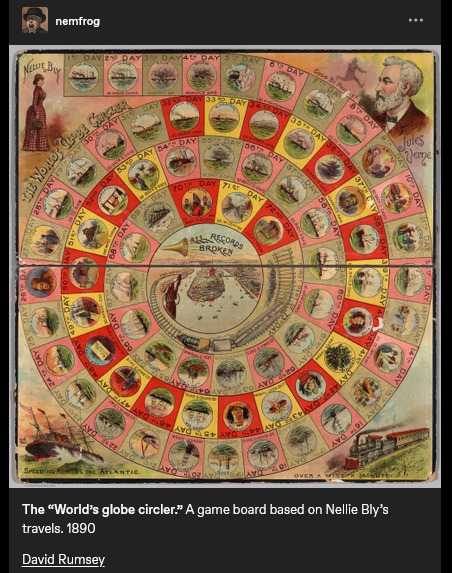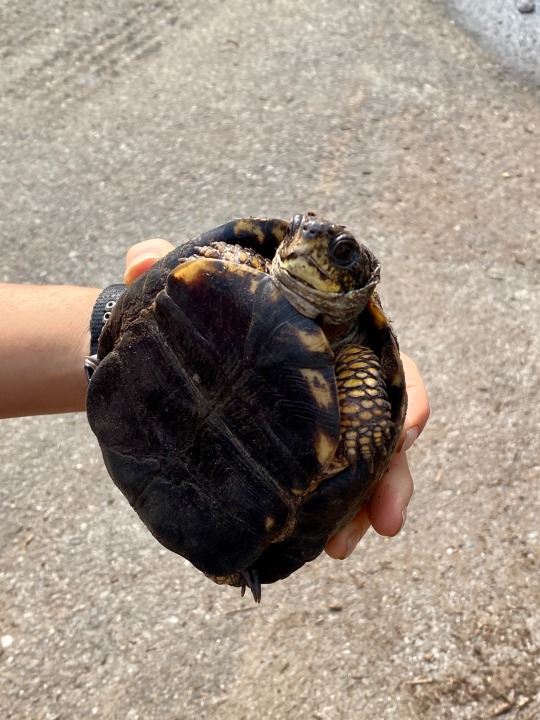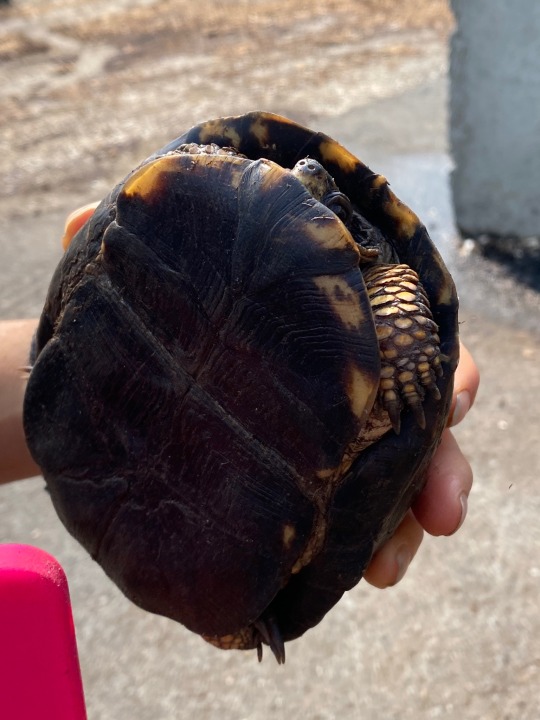#citizen science summer
Explore tagged Tumblr posts
Text
Forget hot girl summer it is
Citizen Science Summer!
Get on eBird, iNaturalist, Seek, whatever apps and forums are cool to you and discover the huge variety of life right under your nose! Snap some pics and record those critters! Rejoice for native bees and plants growing wild by the roadside!!
#ecology#citizen science#ebird#inaturalist#seek#nature#biology#native plants#ecosystems#citizen science summer
2K notes
·
View notes
Text
Tornado Quest Top Science Links For July 20 - 27, 2024 #science #weather #climate #hurricane #drought #wildfire #heatsafety
Greetings everybody! Thanks so much for visiting. The tropical Atlantic is quiet for now due to Saharan dust and unfavorable upper air patterns, but that will change in the coming weeks. There’s no time like this present to get prepared for a tropical storm or hurricane. I’ve plenty of hurricane preparedness information for you. I’ll also continue our overview of summer heat safety. As usual,…

View On WordPress
#astronomy#atlantic hurriance season#citizen science#climate#climate change#climatology#cocorahs#covid#covid 19#drought#drought monitor#health#heat index#heat safety#hurricane#hurricane prep#hurricane preparedness#hurricane safety#look before you lock#meteorology#movie#public health#sars-cov-2#science#space weather#summer heat#technology#tornado research#twisters#us drought monitor
0 notes
Text
So it turns out I live literally RIGHT on the border between the 13 and 17 year cicada broods that are emerging at the same time for the first time in 200 years. I've seen population estimates in the trillions, which realistically isn't an impressive number if we're talking insect population over this much area. However. Cicadas are fucking huge and loud. AND these two broods represent ALL SEVEN periodical cicada species. It's gonna be an interesting summer.
1 note
·
View note
Text
one of the things that's the most fucking frustrating for me about arguing with climate change deniers is the sheer fucking scope of how much it matters. sweating in my father's car, thinking about how it's the "hottest summer so far," every summer. and there's this deep, roiling rage that comes over me, every time.
the stakes are wrong, is the thing. that's part of what makes it not an actual debate: the other side isn't coming to the table with anything to fucking lose.
like okay. i am obviously pro gun control. but there is a basic human part of me that can understand and empathize with someone who says, "i'm worried that would lead to the law-abiding citizens being punished while criminals now essentially have a superpower." i don't agree, but i can tell the stakes for them are also very high.
but let's say the science is wrong and i'm wrong and the visible reality is wrong and every climate disaster refugee is wrong. let's say you're right, humans aren't causing it or it's not happening or whatever else. let's just say that, for fun.
so we spend hundreds of millions of dollars making the earth cleaner, and then it turns out we didn't need to do that. oops! we cleaned the earth. our children grow up with skies full of more butterflies and bees. lawns are taken over with rich local biodiversity. we don't cry over our electric bills anymore. and, if you're staunchly capitalist and i need to speak ROI with you - we've created so many jobs in developing sectors and we have exciting new investment opportunities.
i am reminded of kodak, and how they did not make "the switch" to digital photography; how within 20 years kodak was no longer a household brand. do we, as a nation, feel comfortable watching as the world makes "the switch" while we ride the laurels of oil? this boggles me. i have heard so much propaganda about how america cannot "fall behind" other countries, but in this crucial sector - the one that could actually influence our own monopolies - suddenly we turn the other cheek. but maybe you're right! maybe it will collapse like just another silicone valley dream. but isn't that the crux of capitalism? that some economies will peter out eventually?
but let's say you're right, and i'm wrong, and we stopped fracking for no good reason. that they re-seed quarries. that we tear down unused corporate-owned buildings or at least repurpose them for communities. that we make an effort, and that effort doesn't really help. what happens then? what are the stakes. what have we lost, and what have we gained?
sometimes we take our cars through a car wash and then later, it rains. "oh," we laugh to ourselves. we gripe about it over coffee with our coworkers. what a shame! but we are also aware: the car is cleaner. is that what you are worried about? that you'll make the effort but things will resolve naturally? that it will just be "a waste"?
and what i'm right. what if we're already seeing people lose their houses and their lives. what if it is happening everywhere, not just in coastal towns or equatorial countries you don't care about. what if i'm right and you're wrong but you're yelling and rich and powerful. so we ignore all of the bellwethers and all of the indicators and all of the sirens. what if we say - well, if it happens, it's fate.
nevermind. you wouldn't even wear a mask, anyway. i know what happens when you see disaster. you think the disaster will flinch if you just shout louder. that you can toss enough lives into the storm for the storm to recognize your sacrifice and balk. you argue because it feels good to stand up against "the liberals" even when the situation should not be political. you are busy crying for jesus with a bullhorn while i am trying to usher people into a shelter. you've already locked the doors, even on the church.
the stakes are skewed. you think this is some intellectual "debate" to win, some funny banter. you fuel up your huge unmuddied truck and say suck it to every citizen of that shitbird state california. serves them right for voting blue!
and the rest of us are terrified of the entire fucking environment collapsing.
#spilled ink#writeblr#i hope it is clear here that i actually very much care about equatorial countries#and that's part of what makes me so angry bc im like. climate refugees exist.#they've existed for a while!!!#and the reply is almost always ''should have thought about that before living on an island"#like fuck dude. do you need to like how people vote before ur like#your entire house shouldn't burn down each summer????#so many of these people make it their life to mock california that they think it's FUNNY#and im like. girl you should be fucking trembling. TEXAS??? ARE YOU LISTENING??#this is one of those times that like. i need to stress how fucking stupid it would be#to let trump win. bc he could have “reached across the aisle.” covid could have been#a MASSIVE commercial success. he has such a huge and bigoted and brainwashed following.#literally just a PR campaign called COWBOY UP and it's pictures of cowboys in bandanas#trump reinvisioned as the lone ranger fighting for the american people against covid. EASY SELL#and instead. companies bought him. it became political. it was not ''oh shit this is 1 enemy let's all be human''#it was ''you deserve to die.''#climate change should be GLOBAL. it should be like ''yeah i hate u but. we do all live here''#i don't have to LIKE my group members to do well on a team project bc we are ALL getting graded.#is that simple enough of an under-explaination lol
3K notes
·
View notes
Text
Holy CRAP the UN Cybercrime Treaty is a nightmare

Support me this summer on the Clarion Write-A-Thon and help raise money for the Clarion Science Fiction and Fantasy Writers' Workshop!

If there's one thing I learned from all my years as an NGO delegate to UN specialized agencies, it's that UN treaties are dangerous, liable to capture by unholy alliances of authoritarian states and rapacious global capitalists.
Most of my UN work was on copyright and "paracopyright," and my track record was 2:0; I helped kill a terrible treaty (the WIPO Broadcast Treaty) and helped pass a great one (the Marrakesh Treaty on the rights of people with disabilities to access copyrighted works):
https://www.wipo.int/treaties/en/ip/marrakesh/
It's been many years since I had to shave and stuff myself into a suit and tie and go to Geneva, and I don't miss it – and thankfully, I have colleagues who do that work, better than I ever did. Yesterday, I heard from one such EFF colleague, Katitza Rodriguez, about the Cybercrime Treaty, which is about to pass, and which is, to put it mildly, terrifying:
https://www.eff.org/deeplinks/2024/07/un-cybercrime-draft-convention-dangerously-expands-state-surveillance-powers
Look, cybercrime is a real thing, from pig butchering to ransomware, and there's real, global harms that can be attributed to it. Cybercrime is transnational, making it hard for cops in any one jurisdiction to handle it. So there's a reason to think about formal international standards for fighting cybercrime.
But that's not what's in the Cybercrime Treaty.
Here's a quick sketch of the significant defects in the Cybercrime Treaty.
The treaty has an extremely loose definition of cybercrime, and that looseness is deliberate. In authoritarian states like China and Russia (whose delegations are the driving force behind this treaty), "cybercrime" has come to mean "anything the government disfavors, if you do it with a computer." "Cybercrime" can mean online criticism of the government, or professions of religious belief, or material supporting LGBTQ rights.
Nations that sign up to the Cybercrime Treaty will be obliged to help other nations fight "cybercrime" – however those nations define it. They'll be required to provide surveillance data – for example, by forcing online services within their borders to cough up their users' private data, or even to pressure employees to install back-doors in their systems for ongoing monitoring.
These obligations to aid in surveillance are mandatory, but much of the Cybercrime Treaty is optional. What's optional? The human rights safeguards. Member states "should" or "may" create standards for legality, necessity, proportionality, non-discrimination, and legitimate purpose. But even if they do, the treaty can oblige them to assist in surveillance orders that originate with other states that decided not to create these standards.
When that happens, the citizens of the affected states may never find out about it. There are eight articles in the treaty that establish obligations for indefinite secrecy regarding surveillance undertaken on behalf of other signatories. That means that your government may be asked to spy on you and the people you love, they may order employees of tech companies to backdoor your account and devices, and that fact will remain secret forever. Forget challenging these sneak-and-peek orders in court – you won't even know about them:
https://www.eff.org/deeplinks/2024/06/un-cybercrime-draft-convention-blank-check-unchecked-surveillance-abuses
Now here's the kicker: while this treaty creates broad powers to fight things governments dislike, simply by branding them "cybercrime," it actually undermines the fight against cybercrime itself. Most cybercrime involves exploiting security defects in devices and services – think of ransomware attacks – and the Cybercrime Treaty endangers the security researchers who point out these defects, creating grave criminal liability for the people we rely on to warn us when the tech vendors we rely upon have put us at risk.
This is the granddaddy of tech free speech fights. Since the paper tape days, researchers who discovered defects in critical systems have been intimidated, threatened, sued and even imprisoned for blowing the whistle. Tech giants insist that they should have a veto over who can publish true facts about the defects in their products, and dress up this demand as concern over security. "If you tell bad guys about the mistakes we made, they will exploit those bugs and harm our users. You should tell us about those bugs, sure, but only we can decide when it's the right time for our users and customers to find out about them."
When it comes to warnings about the defects in their own products, corporations have an irreconcilable conflict of interest. Time and again, we've seen corporations rationalize their way into suppressing or ignoring bug reports. Sometimes, they simply delay the warning until they've concluded a merger or secured a board vote on executive compensation.
Sometimes, they decide that a bug is really a feature – like when Facebook decided not to do anything about the fact that anyone could enumerate the full membership of any Facebook group (including, for example, members of a support group for people with cancer). This group enumeration bug was actually a part of the company's advertising targeting system, so they decided to let it stand, rather than re-engineer their surveillance advertising business.
The idea that users are safer when bugs are kept secret is called "security through obscurity" and no one believes in it – except corporate executives. As Bruce Schneier says, "Anyone can design a system that is so secure that they themselves can't break it. That doesn't mean it's secure – it just means that it's secure against people stupider than the system's designer":
The history of massive, brutal cybersecurity breaches is an unbroken string of heartbreakingly naive confidence in security through obscurity:
https://pluralistic.net/2023/02/05/battery-vampire/#drained
But despite this, the idea that some bugs should be kept secret and allowed to fester has powerful champions: a public-private partnership of corporate execs, government spy agencies and cyber-arms dealers. Agencies like the NSA and CIA have huge teams toiling away to discover defects in widely used products. These defects put the populations of their home countries in grave danger, but rather than reporting them, the spy agencies hoard these defects.
The spy agencies have an official doctrine defending this reckless practice: they call it "NOBUS," which stands for "No One But Us." As in: "No one but us is smart enough to find these bugs, so we can keep them secret and use them attack our adversaries, without worrying about those adversaries using them to attack the people we are sworn to protect."
NOBUS is empirically wrong. In the 2010s, we saw a string of leaked NSA and CIA cyberweapons. One of these, "Eternalblue" was incorporated into off-the-shelf ransomware, leading to the ransomware epidemic that rages even today. You can thank the NSA's decision to hoard – rather than disclose and patch – the Eternalblue exploit for the ransoming of cities like Baltimore, hospitals up and down the country, and an oil pipeline:
https://en.wikipedia.org/wiki/EternalBlue
The leak of these cyberweapons didn't just provide raw material for the world's cybercriminals, it also provided data for researchers. A study of CIA and NSA NOBUS defects found that there was a one-in-five chance of a bug that had been hoarded by a spy agency being independently discovered by a criminal, weaponized, and released into the wild.
Not every government has the wherewithal to staff its own defect-mining operation, but that's where the private sector steps in. Cyber-arms dealers like the NSO Group find or buy security defects in widely used products and services and turn them into products – military-grade cyberweapons that are used to attack human rights groups, opposition figures, and journalists:
https://pluralistic.net/2021/10/24/breaking-the-news/#kingdom
A good Cybercrime Treaty would recognize the perverse incentives that create the coalition to keep us from knowing which products we can trust and which ones we should avoid. It would shut down companies like the NSO Group, ban spy agencies from hoarding defects, and establish an absolute defense for security researchers who reveal true facts about defects.
Instead, the Cybercrime Treaty creates new obligations on signatories to help other countries' cops and courts silence and punish security researchers who make these true disclosures, ensuring that spies and criminals will know which products aren't safe to use, but we won't (until it's too late):
https://www.eff.org/deeplinks/2024/06/if-not-amended-states-must-reject-flawed-draft-un-cybercrime-convention
A Cybercrime Treaty is a good idea, and even this Cybercrime Treaty could be salvaged. The member-states have it in their power to accept proposed revisions that would protect human rights and security researchers, narrow the definition of "cybercrime," and mandate transparency. They could establish member states' powers to refuse illegitimate requests from other countries:
https://www.eff.org/press/releases/media-briefing-eff-partners-warn-un-member-states-are-poised-approve-dangerou

If you'd like an essay-formatted version of this post to read or share, here's a link to it on pluralistic.net, my surveillance-free, ad-free, tracker-free blog:
https://pluralistic.net/2024/07/23/expanded-spying-powers/#in-russia-crime-cybers-you

Image: EFF https://www.eff.org/files/banner_library/cybercrime-2024-2b.jpg
CC BY 3.0 https://creativecommons.org/licenses/by/3.0/us/
845 notes
·
View notes
Text
About the entanglement of "science" and Empire. About geographic imaginaries. About how Empire appeals to and encourages children to participate in these scripts.
Was checking out this recent thing, from scavengedluxury's beloved series of posts looking at the archive of the Budapest Municipal Photography Company.

The caption reads: "Toys and board games, 1940."
And I think the text on the game-box in the back says something like "the whole world is yours", maybe?
(The use of appeals to science/progress in imperial narratives probably already well-known to many, especially for those familiar with Victorian era, Edwardian era, Gilded Age, early twentieth century, etc., in US and Europe.)
And was struck, because I had also recently gone looking through nemfrog's posts about the often-strange imagery of children's material in late nineteenth- and early twentieth-century US/Europe. And was disturbed/intrigued by this thing:

Caption here reads: "Game Board. Walter Mittelholzer's flight over Africa. [...] 1931. Commemorative game board map of Africa for a promotional game published for the N*stle Company, for tracking the trip of Walter Mittelholzer across Africa, the first pilot to fly a north-south route."
Hmm.
"Africa is for your consumption and pleasure! A special game celebrating German achievement, brought to you by the N*stle Company!"
1930s-era German national aspirations in Africa. A company which, in the preceding decade, had shifted focus to expand its cacao production (which would be dependent on tropical plantations). Adventure, excitement, knowledge, science, engineering prowess, etc. For kids!
Another, from a couple decades earlier, this time British.

Caption reads: "The "World's globe circler." A game board based on Nellie Bly's travels. 1890." At center, a trumpet, and a proclamation: "ALL RECORDS BROKEN".
Same year that the United States "closed the frontier" and conquered "the Wild West" (the massacre at Wounded Knee happened in December 1890). A couple years later, the US annexed Hawai'i; by decade's end, the US military was in both Cuba and the Philippines. The Scramble for Africa was taking place. At the time, Britain especially already had a culture of "travel writing" or "travel fiction" or whatever we want to call it, wherein domestic residents of the metropole back home could read about travel, tourism, expeditions, adventures, etc. on the peripheries of the Empire. Concurrent with the advent of popular novels, magazines, mass-market print media, etc. Intrepid explorers rescuing Indigenous peoples from their own backwardness. Many tales of exotic allure set in South Asia. Heroic white hunters taking down scary tigers. Elegant Englishwomen sipping tea in the shade of an umbrella, giggling at the elephants, the local customs, the strange sights. Orientalism, tropicality, othering.
I'd lately been looking at a lot of work on race/racism and imperative-of-empire in British scientific and pop-sci literature, especially involving South and Southeast Asia. (From scholars like Varun Sharma, Rohan Deb Roy, Ezra Rashkow, Jonathan Saha, Pratik Chakrabarti.) But I'd also lately been looking at Mashid Mayar's work, which I think closely suits this kinda thing with the board games. Some of her publications:
"From Tools to Toys: American Dissected Maps and Geographic Knowledge at the Turn of the Twentieth Century". In: Knowledge Landscapes North America, edited by Kloeckner et al., 2016.
"What on Earth! Slated Globes, School Geography and Imperial Pedagogy". European Journal of American Studies 16, number 3, Summer 2020.
Citizens and Rulers of the World: The American Child and the Cartographic Pedagogies of Empire, 2022.
Discussing her book, Mayar was interviewed by LA Review of Books in 2022. She says:
[Quote.] Growing up at the turn of the 20th century, for many American children, also meant learning to view the world through the lens of "home geography." [...] [T]hey inevitably responded to the transnational whims of an empire that had stretched its dominion across the globe [recent forays into Panama, Cuba, Hawai'i, the Philippines] [...]. [W]hite, well-to-do, literate American children [...] learned how to identify and imagine “homes” on the map of the world. [...] [T]he cognitive maps children developed, to which we have access through the scant archival records they left behind (i.e., geographical puzzles they designed and printed in juvenile periodicals) [...] mixed nativism and the logic of colonization with playful, appropriative scalar confusion, and an intimate, often unquestioned sense of belonging to the global expanse of an empire [...]. Dissected maps - that is, maps mounted on cardboard or wood and then cut into smaller pieces that children were to put back together - are a generative example of the ways imperial pedagogy [...] found its place outside formal education, in children's lives outside the classroom. [...] [W]ell before having been adopted as playthings in the United States, dissected maps had been designed to entertain and teach the children of King George III about the global spatial affairs of the British Empire. […] [J]uvenile periodicals of the time printed child-made geographical puzzles [...]. [I]t was their assumption that "(un)charted," non-American spaces (both inside and outside the national borders) sought legibility as potential homes, [...] and that, if they did not do so, they were bound to recede into ruin/"savagery," meaning that it would become the colonizers' responsibility/burden to "restore" them [...]. [E]mpires learn from and owe to childhood in their attempts at survival and growth over generations [...]. [These] "multigenerational power constellations" [...] survived, by making accessible pedagogical scripts that children of the white and wealthy could learn from and appropriate as times changed [...]. [End quote.] Source: Words of Mashid Mayar, as transcribed in an interviewed conducted and published by M. Buna. "Children's Maps of the American Empire: A Conversation with Mashid Mayar". LA Review of Books. 11 July 2022.
Some other stuff I was recently looking at, specifically about European (especially German) geographic imaginaries of globe-as-playground:
The Play World: Toys, Texts, and the Transatlantic German Childhood (Patricia Anne Simpson, 2020) /// "19th-Century Board Game Offers a Tour of the German Colonies" (Sarah Zabrodski, 2016) /// Advertising Empire: Race and Visual Culture in Imperial Germany (David Ciarlo, 2011) /// Learning Empire: Globalization and the German Quest for World Status, 1875-1919 (Erik Grimmer-Solem, 2019) /// “Ruling Africa: Science as Sovereignty in the German Colonial Empire and Its Aftermath” (Andrew Zimmerman. In: German Colonialism in a Global Age, 2014) /// "Exotic Education: Writing Empire for German Boys and Girls, 1884-1914". (Jeffrey Bowersox. In: German Colonialism and National Identity, 2017) /// Raising Germans in the Age of Empire: Youth and Colonial Culture, 1871-1914 (Jeff Bowersox, 2013) /// "[Translation:] (Educating Modernism: A Trade-Specific Portrait of the German Toy Industry in the Developing Mass-Market Society)" (Heike Hoffmann, PhD dissertation, Tubingen, 2000) /// Home and Harem: Nature, Gender, Empire, and the Cultures of Travel (Inderpal Grewal, 1996) /// "'Le rix d'Indochine' at the French Table: Representation of Food, Race and the Vietnamese in a Colonial-Era Board Game" (Elizabeth Collins, 2021) /// "The Beast in a Box: Playing with Empire in Early Nineteenth-Century Britain" (Romita Ray, 2006) /// Playing Oppression: The Legacy of Conquest and Empire in Colonialist Board Games (Mary Flanagan and Mikael Jakobsson, 2023)
#mashid mayar book is useful also the Playing Oppression book is open access online if you want#in her article on slated globes mayar also mentions how european maps by 1890s provoked a sort of replete homogenous filling in of globe#where european metropole thought of itself as having sufficiently mapped the planet by now knit into neat web of interimperial trade#and so european apparent knowledge of globe provided apparently enlightened position of educating or subjugating the masses#whereas US at time was more interested in remapping at their discretion#a thing which relates to what we were talking about in posts earlier today where elizabeth deloughrey describes twentieth century US#and its aerial photographic and satellite perspectives especially of Oceania and Pacific as if it now understood the totality of the planet#ecologies#tidalectics#geographic imaginaries#mashid mayar#indigenous pedagogies#black methodologies
136 notes
·
View notes
Text
The Ford government’s decision to shutter the Ontario Science Centre in Toronto’s Don Mills area with no warning Friday is drawing outrage from critics and members of the local community. The government cited safety concerns after releasing an engineering report on the current structure which opened to the public in 1969. The government used the report to justify closing the Science Centre immediately. “We were worried this stunt would be pulled by Premier Ford and the Ontario government,” said Jason Ash, co-chair of Save Ontario’s Science Centre, a citizen group campaigning to keep the current site. [...]
Sameer Sayed and his three children live across the street from the Science Centre and are regular visitors, especially in the summer. “If you can’t convince them, confuse them,” Sayed said, describing his view that the provincial government is trying to convince the public that the structure isn’t safe to justify the move to Ontario Place and quell opposition to the decision. [...]
Continue Reading.
Tagging: @newsfromstolenland, @vague-humanoid
107 notes
·
View notes
Note
Your blog is lovely and I love learning things from it and when you talk about native or non native plants and such, but I wanted to ask; How do you know which is which?
Are there specific search terms I can use to find out for my own area? or books?
I like teaching myself stuff, but this is one of those things that I have no idea where to start really
Love this question! Truthfully I am still very much a novice at identifying the vast majority of plants and animals out there, but I am constantly making use of the information at my disposal in order to learn more. We are so lucky to have such a wealth of knowledge about the natural world so close at hand!
I have a bachelors in biology with a focus in conservation, but even so I would say that a majority of my field identification skills are self-taught. I cannot recommend enough utilizing citizen science apps to get familiar with your native fauna!
I once spent a single summer where I challenged myself to take a photo of every single animal (bird, insect, fish, etc) that I couldn’t identify by name. I would post the images on an app like iNatualist or another reliable identification forum, and once I had a name I’d do a little research to learn more about my neighbor. This is how I came to recognize quite a few introduced species that have made my ecosystem home.
If you ever find yourself with a little extra time (+/- money) on your hands, you could also consider taking an adult naturalist class. If you happen to live in the United States for example, most states have a certified master naturalist program that anyone over the age of 18 can sign up for to learn about the local ecosystems. This would be a fun, if a little more involved, way of getting familiar with your local flora and fauna.
53 notes
·
View notes
Text
Sim Dump | Strangers
















"A group of Sixam citizens have been sent to Strangerville to gather vital data on various Sim behaviours, lifestyles, and sciences. Each has a unique set of interests and traits which gives them each a special interest area of study and unique mission for their stay in this unusual world. How will their stories and research unfold as they try to live amongst the Sims they are investigating - will they stay hidden and blend in, or will the chaos of Sim life cause the mask to slip?" 1 ; Paul Carlson | DOWNLOAD - LOOKBOOK/CC >> 2 ; Ziggy Edwards | DOWNLOAD - LOOKBOOK/CC >> 3 ; Isodora Buggs | DOWNLOAD - LOOKBOOK/CC >> 4 ; Kay Zoyle | DOWNLOAD - LOOKBOOK/CC >> 5 ; Dwight Zoyle | DOWNLOAD - LOOKBOOK/CC >> 6 ; Dana Lovett | DOWNLOAD - LOOKBOOK/CC >> 7 ; Summer Falls | DOWNLOAD - LOOKBOOK/CC >> 8 ; Charles Hope | DOWNLOAD + LOOKCOOK/CC >>
DOWNLOAD - CC Included Versions (SFS) >>
#the sims 4#ts4#simblr#sims#sims 4#show us your sims#sims 4 aesthetic#strangerville#sims aliens#sim dump#sims 4 cas#customsavehousholds#individual#individualhousehold#elinorasimshouseholds#alien sim dump#young adults#ts4 aliens#maxis mix#strangerville sims#aliens#my sims#ts4 simblr
37 notes
·
View notes
Text
"Far from being exceptional in American history, gun-control regulations are the default. If 'Bruen' was designed to nullify the constitutional basis for many gun laws, it ought to fail."
--Robert J. Spitzer, political science professor emeritus at SUNY Cortland

Robert J. Spitzer, professor emeritus at SUNY Cortland outlines the early--and plentiful--history of gun regulation laws in early American history. Consequently, Clarence Thomas's 2022 Bruen decision might not be the disaster for gun control that some people have thought. Below are some excerpts from the article.

In the summer of 1619, the leaders of the fledgling Jamestown colony came together as the first general assembly to enact “just Laws for the happy guiding and governing of the people there inhabiting.” Consisting of the governor, Sir George Yeardley; his four councillors; and 22 elected “burgesses,” or representatives, the group approved more than 30 measures. Among them was the nation’s first gun law:
"That no man do sell or give any Indians any piece, shot, or powder, or any other arms offensive or defensive, upon pain of being held a traitor to the colony and of being hanged as soon as the fact is proved, without all redemption."
After that early example of gun control came many more laws placing restrictions on the ownership and use of firearms. If guns have always been part of American society, so have gun laws. This fact might come as a surprise to some gun-rights advocates, who seem to believe that America’s past was one of unregulated gun ownership. That view received a big assist in 2022, when the Supreme Court declared in "New York State Rifle & Pistol Association Inc. v. Bruen" that the constitutionality of modern gun laws depends on whether they are “consistent with this Nation’s historical tradition of firearm regulation.” In other words, the constitutional standard for any modern gun law boils down to whether you can find a good precedent for it back in the 1700s or 1800s. The advocates’ assumption is that such precedents are few and far between, but thanks to the work of researchers and the digitization of archival material, thousands of old gun laws, of every imaginable variety, are now available for reference. Far from being exceptional in American history, gun-control regulations are the default. If "Bruen" was designed to nullify the constitutional basis for many gun laws, it ought to fail. [...] Throughout this long period in the history of the republic, up until the beginning of the 20th century, gun laws placed conditions or restrictions on weapons access for a wide variety of citizens—in particular, indentured servants, vagrants, non-Protestants, those who refused to swear an oath of loyalty to the government, felons, foreigners, minors, and those under the influence of alcohol. Numerous laws regulated hunting practices, as well as firearms’ carry, use, storage, and transportation; regulated the manufacture, inspection, storage, and sale of firearms; imposed gun licensing; and restricted dangerous or unusual weapons. Despite the Thomas opinion’s claim that “the historical record yields relatively few 18th- and 19th-century ‘sensitive places’ where weapons were altogether prohibited,” some local authorities outlawed the discharge of firearms in or near towns, buildings, or roads, as well as after dark, on Sundays, at public gatherings, and in cemeteries. In some jurisdictions, any use of a firearm that wasted gunpowder was also an offense. [...] In the post-revolutionary 1800s, as rising violent crime led more people to arm themselves, a total of 42 states (plus the District of Columbia) enacted laws against concealed carry. Three more did so in the early 1900s, so that the total included almost every state in the Union. As many states from the 1700s to 1900s also enacted some form of weapons-licensing law. That’s not all. Over that same period, at least 22 states restricted any gun carrying, including of long guns. Moreover, across the entire period, three-quarters of the states had laws either against “brandishing”—waving a gun around in a menacing or threatening manner—or merely having a weapon on display in public. [...] In addition, even though for much of its history America was an agrarian country...its lawmakers and enforcers were inventive and determined about ensuring public safety. When they perceived a threat to that order from firearms, they passed laws to restrict or prevent them. And back then, by and large, no court struck those laws down. That is what is truly consistent with this nation’s historical tradition of firearm regulation. So if we accept the originalist premise of "Bruen," the actual result should be to render a broad array of gun regulations constitutional. [color emphasis added]
#american history#gun control#america's original gun control#robert j. spitzer#bruen decision#the atlantic
93 notes
·
View notes
Text
Electronic albums I like from the 90s
Talking the 90s might be a lengthy way to explain in some segments why I chose these records. While grunge was getting some attention, there were underground music going on like death metal, black metal, techno, electronic music, etc.
This post is the same premise as the last one.
1990: Depeche Mode - Violator (my fave album) The Shamen - En-Tact Leather Strip - Science for the Satanic Citizen Nitzer Ebb - Showtime Angelo Badalamenti - Twin Peaks OST
1991: Lords of Acid - Lust Front 242 - Tyranny For You Delerium - Stone Tower Biosphere - Microgravity LFO - Frequencies 808 State - ex:el Massive Attack - Blue Lines
1992: Front Line Assembly - Tactical Neural Implant Aphex Twin - Selected Ambient Works 85-92 Vangelis - 1492 OST KMFDM - Money Go West - Indian Summer Jeff Greinke - Lost Terrain
1993: Polygon Window - Surfing On Sine Waves Depeche Mode - Songs of Faith and Devotion F.U.S.E. - Dimension Intrusion
1994: Vangelis - Blade Runner Underworld - dubnobasswithmyheadman Massive Attack - Protection Aphex Twin - Selected Ambient Works Volume II Autechre - Amber
1995: The Frozen Autumn - Pale Awakening Aphex Twin - …I Care Because You Do
1996: burger/ink - Las Vegas Underworld - Second Toughest in the Infants
1997: Depeche Mode - Ultra (my fave album) The Frozen Autumn - Fragments of Memories The Prodigy - The Fat of the Land Information Society - Don't Be Afraid KMFDM - Symbols Savage Garden - Savage Garden Aqua - Aquarium
1998: Plastikman - Consumed UNKLE - Psyence Fiction Bola - Soup Madonna - Ray of Light Massive Attack - Mezzanine VNV Nation - Praise the Fallen
1999: Underworld - Beaucoup Fish VNV Nation - Empires Nine Inch Nails - The Fragile Forest Silence - Winter Circle
#90s music#1990s#90s albums#90s electronic#the prodigy#savage garden#nin#nine inch nails#kmfdm#depeche mode
17 notes
·
View notes
Text


Met this lovely female box turtle at work today! We relocated her to an appropriate pile of brush instead of the mulch pile we were actively using, and my coworker took photos and uploaded some information to a box turtle conservation site.
#citizen science summer#ecology#biology#herpetology#turtle#box turtle#terrapene carolina#herping#reptiles#Mother Nature#my photography
24 notes
·
View notes
Text
Tornado Quest Top Science Links For July 13 - 20, 2024 #science #weather #climate #tornado #hurricane #drought #heatsafety #astronomy
Greetings everybody! Thanks so much for visiting. The tropical Atlantic is quiet for now, but that will change in the coming weeks. There’s no time like this present to get prepared for a tropical storm or hurricane. I’ve plenty of hurricane preparedness information for you. I’ll also continue our overview of summer heat safety and tornado safety. As usual, there are several interesting science…

View On WordPress
#astronomy#citizen science#citizenscience#climate#climate change#climate crisis#climate emergency#climatology#cocorahs#drought#drought monitor#emergency kit#environment#exoplanet#flash flood safety#history#history of medicine#history of science#hurricane prep#hurricane preparedness#look before you lock#medical history#meteorology#moon#saturn#science#space hurricane#space weather#storm surge#summer
0 notes
Text

Mary "Te Ata" Thompson Fisher
1895 - 1995 Lived to be 100 yrs old ...
Te Ata Thompson Fisher, whose name means “Bearer of the Morning,” was born Dec. 3, 1895, near Emet, Oklahoma. A citizen of the Chickasaw Nation, Te Ata was an accomplished actor and teller of Native American stories ... She received her early education in Tishomingo, and eventually went to the Oklahoma College for Women. While there, it was evident Te Ata had a natural talent for drama ... Her career as an actor and storyteller spanned more than 60 years. She worked as a storyteller to finance her acting career. She would tell Chickasaw legends, myths and chants, including performing rituals in native regalia ... Te Ata attended the Carnegie Institute of Technology in Pittsburgh, Pennsylvania, for one year. From there, she moved to New York City, where she met and married Clyde Fisher. During the 1930s she performed at summer camps in New York and New England ... In the prime of her career, she performed in England and Scandinavia, at the White House for President Franklin Roosevelt, for the King and Queen of Great Britain, and on stages across the United States ... Although Te Ata worked as an actor and drama instructor, she is best known for her artistic interpretations of Indian folklore, and for her children's book she co-authored on the subject ... Her world-renown talent has won her several honors including induction into the Oklahoma Hall of Fame in 1957, being named The Ladies’ Home Journal Woman of the Year in 1976, being named Oklahoma's Official State Treasure in 1987, and having a lake near Bear Mountain in New York named in her honor ... She is also the subject of a video, God's Drum, the proceeds of which have supported the Te Ata Scholarship Fund for Indian students at her alma mater, the University of Science and Arts of Oklahoma in Chickasha, Oklahoma.
Te Ata died Oct. 26, 1995, in Oklahoma City, though her legacy and influence on the Native American storytelling traditions continues to this day.
15 notes
·
View notes
Text
Hopkins concludes that we are living in a system, a simulation, a “global-capitalist form of totalitarianism”, but he is unaware of Technocracy. The “system” is based on Technocracy because that’s what Technocracy is. Arch-Technocrat Elon Musk has emerged as a cult leader/messiah figure to lead the world into Technocracy while fooling the plebes into thinking they can Make America Great Again. ⁃ Patrick Wood, Editor.
Once upon a time, on a planet called Earth, there was born a global-capitalist empire. It was the first global empire in the history of empires. It dominated the entire planet.
No one knew what to call the empire, because there had never been anything like it in history. It had no external adversaries, so it had nothing left to do but “clear and hold,” i.e., neutralize internal resistance and consolidate its domination of the planet.
So that is what it set about doing.
It did this first in the territories of its final ideological adversary, an empire called the Soviet Union, the ideology of which was known as “Communism.”
This was known as the “Post-Cold-War Era.”
It did this next in the Greater Middle East, where people were still trying to live their lives according to a religion known as “Islam.”
This was known as the “Global War on Terror.”
The Global War on Terror was originally intended to go on forever, and it would have, and it will, but it had to be temporarily suspended, and rebranded, because something unexpected happened.
One day, in the Summer of 2016 — theretofore officially “The Summer of Fear” — the global-capitalist empire noticed that a new form of resistance to its domination of the entire planet had risen up, not in the former Soviet Union, or the Greater Middle East, but throughout the West, right in the very heart of the empire.
And so the War on Terror was suspended, and the War on Populism began.
The War on Populism raged for four years, and culminated in the rollout of the New Normal, officially known as “the Covid pandemic.”
For over two years, i.e., from March 2020 to approximately December 2022, the global-capitalist empire morphed into a new form of totalitarianism, a global-capitalist form of totalitarianism, which was not like any other previous form of totalitarianism.
This period was the shock-and-awe phase of the rollout of the New Normal Reich.
The transition to the New Normal Reich was broadcast throughout the global empire. The message was unmistakeably clear. From now on, there would be a “New Normal.” It would be like a permanent state of war, a permanent state of civil war. And so, from now on everyone would need to pledge their allegiance to the New Normal Reich, and follow orders, or be labelled an “extremist,” a “science denier,” a “conspiracy theorist,” or some other type of seditious deviant.
The vast majority of the citizens of the West understood the message, followed orders, and pledged allegiance to the New Normal Reich. But a sizeable minority did not. The global-capitalist empire needed to neutralize this sizeable minority.
The majority of this sizeable minority was comprised of conservative, libertarian, and other basically right-leaning people. It contained a few old-school left-leaning people, but they were a minority within a minority, and so they weren’t really a factor when it came to neutralizing the larger minority, which the empire promptly set about doing.
5 notes
·
View notes
Text
This day in history

TODAY (July 14), I'm giving the closing keynote for the fifteenth HACKERS ON PLANET EARTH, in QUEENS, NY. Happy Bastille Day! NEXT SATURDAY (July 20), I'm appearing in CHICAGO at Exile in Bookville.

#20yrsago RIAA’s INDUCE Act letter deconstructed https://corante.com/importance/the-excessively-annotated-riaa-letter-on-the-induce-act-iica/
#20yrsago Lou Reed wants remixes https://web.archive.org/web/20040804104424/https://www.billboard.com/bb/daily/article_display.jsp?vnu_content_id=1000577588
#20yrsago ICANN emancipate domain owners from scummy registrars https://web.archive.org/web/20040722061910/http://www.byte.org/blog/_archives/2004/7/14/105552.html
#20yrsago Disney’s $80 million mistake: Fahrenheit 911 https://web.archive.org/web/20040804183640/https://www.technicianonline.com/story.php?id=009702
#20yrsago Druid busted for possession of a sword https://mg.co.za/article/2004-07-13-swordpacking-druid-appears-in-court/
#15yrsago Michael Jackson didn’t sell 750 million records https://www.wsj.com/articles/SB124760651612341407
#15yrsago Phones confiscated at preview screenings: whose hypothetical risk is more important? https://www.theguardian.com/technology/2009/jul/14/mobile-phones-and-movie-security
#15yrsago Visa claims teen spent $23,148,855,308,184,500.00 on prepaid credit card https://web.archive.org/web/20090716125509/https://consumerist.com/5314246/unruly-teen-charges-23-quadrillion-at-drugstore
#10yrsago Freedom of info funnies: CIA cafeteria complaints https://www.muckrock.com/news/archives/2014/jul/14/doc-note-cia-cafeteria-complaints/
#10yrsago Economist examines empirical evidence of file-sharing on box-office revenue https://web.archive.org/web/20140816180401/http://conference.nber.org/confer/2014/SI2014/PRIT/Strumpf.pdf
#10yrsago Understanding #DRIP: new spy powers being rammed through UK Parliament https://web.archive.org/web/20140711071612/https://www.openrightsgroup.org/campaigns/no-emergency-stop-the-data-retention-stitch-up
#10yrsago Tesla’s “car-as-service” versus your right to see your data https://appliedabstractions.com/2014/07/14/elon-i-want-my-data/
#10yrsago Scalia may have opened path for Quakers to abstain from taxes https://www.salon.com/2014/07/14/scalias_major_screw_up_how_scotus_just_gave_liberals_a_huge_gift/
#10yrsago Unions considered helpful (economically) https://stumblingandmumbling.typepad.com/stumbling_and_mumbling/2014/07/unions-productivity-.html
#10yrsago Hearings into mass surveillance begin in UK https://www.theguardian.com/uk-news/2014/jul/14/court-gchq-surveillance-tempora-ipt-nsa-snowden
#10yrsago Everyone hates the NSA: survey https://web.archive.org/web/20140715012054/http://www.pewglobal.org/2014/07/14/nsa-opinion/table/country-citizens/
#10yrsago GCHQ’s black bag of dirty hacking tricks revealed https://web.archive.org/web/20140714190448/https://firstlook.org/theintercept/2014/07/14/manipulating-online-polls-ways-british-spies-seek-control-internet/
#10yrsago Snowden: #DRIP “defies belief,” could have been dreamed up by NSA https://www.theguardian.com/world/2014/jul/13/edward-snowden-condemns-britain-emergency-surveillance-bill-nsa
#5yrsago Florida DMV makes millions selling Floridians’ data…for pennies (and you can’t opt out) https://www.wxyz.com/news/national/florida-is-selling-drivers-personal-information-to-private-companies-and-marketing-firms
#5yrsago #TelegramGate: leaks show Puerto Rico’s appointed officials mocking the dead as hurricanes devastate the island https://web.archive.org/web/20190714004011/https://abcnews.go.com/International/wireStory/puerto-rican-chief-financial-officer-resigns-chat-scandal-64318436
#1yrago Why they're smearing Lina Khan https://pluralistic.net/2023/07/14/making-good-trouble/#the-peoples-champion

Support me this summer on the Clarion Write-A-Thon and help raise money for the Clarion Science Fiction and Fantasy Writers' Workshop!
11 notes
·
View notes